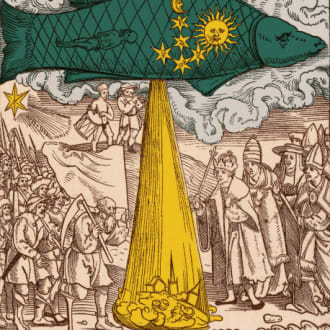Goodbye to the Vikings
Ben Jones (detail). There was no such thing as a ‘Viking’ in the medieval period. Use of the term emerged in the 19th century. The word wicing occurred in Old English and víkingr in Old Icelandic, but…
More from History Today
What was the Impact of Julius Caesar’s Murder?
‘The Death of Caesar’ (detail), by Vincenzo Camuccini, c.1804. Wiki Commons/Galleria Nazionale d'Arte Moderna e Contemporanea, Rome. ‘Caesar’s is the only death that still reverberates’ Emma Southon,…
Bad Omens: When the Astrologers Got it Wrong
On the morning of 1 February 1524 hundreds of Londoners gathered by the Thames in dreadful anticipation. This day had been a long time coming. Preparations had begun months and, in some cases, years…
Explicit Content
Scene from The New Art and Mystery of Gossiping, Being a Genuine Account of All the Women’s Clubs in and about the City and Suburbs of London, c.1760. British Library Board. *** What follows will be…
The King Who Wasn't There
Prester John on his throne in Ethiopia, from a map of East Africa in the Queen Mary Atlas, by Diogo Homem, Portuguese, 1558. © British Library Board. All Rights Reserved/Bridgeman Images. Early in…
What is Refind?
Every day Refind picks the most relevant links from around the web for you. Picking only a handful of links means focusing on what’s relevant and useful. We favor timeless pieces—links with long shelf-lives, articles that are still relevant one month, one year, or even ten years from now. These lists of the best resources on any topic are the result of years of careful curation.
How does Refind curate?
It’s a mix of human and algorithmic curation, following a number of steps:
- We monitor 10k+ sources and 1k+ thought leaders on hundreds of topics—publications, blogs, news sites, newsletters, Substack, Medium, Twitter, etc.
- In addition, our users save links from around the web using our Save buttons and our extensions.
- Our algorithm processes 100k+ new links every day and uses external signals to find the most relevant ones, focusing on timeless pieces.
- Our community of active users gets the most relevant links every day, tailored to their interests. They provide feedback via implicit and explicit signals: open, read, listen, share, mark as read, read later, «More/less like this», etc.
- Our algorithm uses these internal signals to refine the selection.
- In addition, we have expert curators who manually curate niche topics.
The result: lists of the best and most useful articles on hundreds of topics.
How does Refind detect «timeless» pieces?
We focus on pieces with long shelf-lives—not news. We determine «timelessness» via a number of metrics, for example, the consumption pattern of links over time.
How many sources does Refind monitor?
We monitor 10k+ content sources on hundreds of topics—publications, blogs, news sites, newsletters, Substack, Medium, Twitter, etc.
Can I submit a link?
Indirectly, by using Refind and saving links from outside (e.g., via our extensions).
How can I report a problem?
When you’re logged-in, you can flag any link via the «More» (...) menu. You can also report problems via email to hello@refind.com
Who uses Refind?
450k+ smart people start their day with Refind. To learn something new. To get inspired. To move forward. Our apps have a 4.9/5 rating.
Is Refind free?
Yes, it’s free!
How can I sign up?
Head over to our homepage and sign up by email or with your Twitter or Google account.



